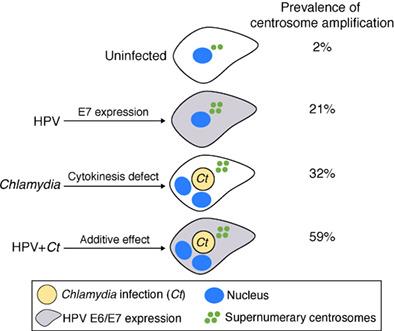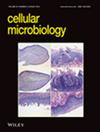Chlamydia and HPV induce centrosome amplification in the host cell through additive mechanisms
Abstract
Based on epidemiology studies, Chlamydia trachomatis has been proposed as a co-factor for human papillomavirus (HPV) in the development of cervical cancer. These two intracellular pathogens have been independently reported to induce the production of extra centrosomes, or centrosome amplification, which is a hallmark of cancer cells. We developed a cell culture model to systematically measure the individual and combined effects of Chlamydia and HPV on the centrosome in the same host cell. We found that C. trachomatis caused centrosome amplification in a greater proportion of cells than HPV and that the effects of the two pathogens on the centrosome were additive. Furthermore, centrosome amplification induced by Chlamydia, but not by HPV, strongly correlated with multinucleation and required progression through mitosis. Our results suggest that C. trachomatis and HPV induce centrosome amplification through different mechanisms, with the chlamydial effect being largely due to a failure in cytokinesis that also results in multinucleation. Our findings provide support for C. trachomatis as a co-factor for HPV in carcinogenesis and offer mechanistic insights into how two infectious agents may cooperate to promote cancer.
Take Aways
• Chlamydia and HPV induce centrosome amplification in an additive manner.
• Chlamydia-induced centrosome amplification is linked to host cell multinucleation.
• Chlamydia-induced centrosome amplification requires cell cycle progression.
• Chlamydia and HPV cause centrosome amplification through different mechanisms.
• This study supports Chlamydia as a co-factor for HPV in carcinogenesis.


 求助内容:
求助内容: 应助结果提醒方式:
应助结果提醒方式:


